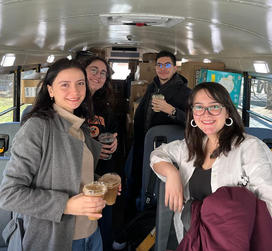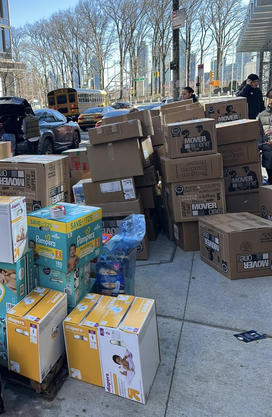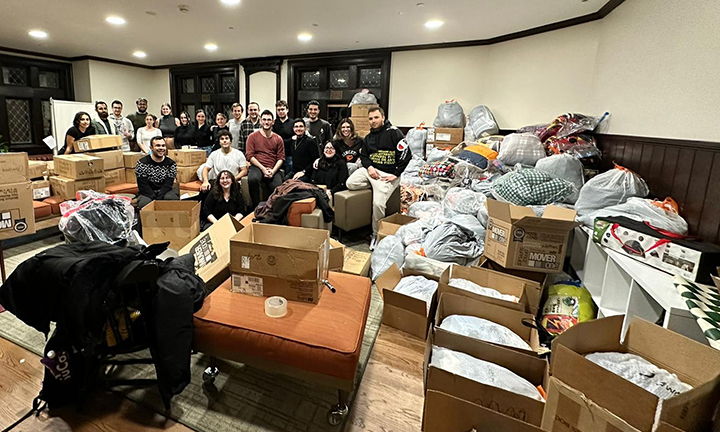Students Support Turkey and Syria Following Earthquakes
Less than 24 hours after the initial 7.8-magnitude earthquake, students began organizing relief efforts
Princeton students are leading the charge to support survivors in Turkey and Syria after a series of devastating earthquakes killed more than 50,000, according to estimates by Reuters and Al Jazeera.
Less than 24 hours after an initial 7.8-magnitude earthquake struck the region on Feb. 6, students began organizing relief efforts. Within a few days, they had collected and shipped supplies to the affected area, held a vigil, and started a campaign to send monetary support.
“One of the cities that’s been affected by the earthquake was my dad’s hometown,” Sena Çetin ’26, vice president of the Undergraduate Turkish Student Association (TSA), told PAW. “Our entire city has been destroyed. So many of our neighbors have passed away. And the cities are in, I think, worse condition than [is being] portrayed in the media.”
TSA worked with several other student groups, such as the Graduate Turkish Student Association, the Arab Society, the Balkan Society, Muslim Students Association, and Intercultural Students of America, to collect winter clothing, sleeping bags, solar-powered lanterns, and non-perishable food. Within a week, they delivered 150 boxes of supplies to the Turkish Consulate General in New York City via a bus provided by the University.

On Friday, Feb. 10, TSA partnered with the Office of the Dean of Undergraduate Students to hold a vigil outside Nassau Hall where students and faculty spoke about the impacts of the tragedy and prayed together.
“People are in dire, dire need of help. So that’s been very sad, very frustrating, because we’re so far away and there’s a limit to how much and what we can do,” Çetin said, also noting that the situation has taken away from time she normally devotes to her coursework.
According to Çetin, students have faced barriers, such as policies around collecting money, which prevented monetary donations from entering University accounts. Çetin instead had to direct potential donors to her personal Venmo; about $13,000 was eventually sent to Ahbap, an NGO founded by a Turkish musician and philanthropist.
“We kind of had to find ways of maneuvering around University policy and bureaucracy to do the best we can to help people out in their time of need,” Çetin said.
At a Pace Center for Civic Engagement gathering, held on Zoom on Feb. 10, four days after the initial earthquake, students and staff from Turkey expressed how drained they were and asked for additional institutional support. At a second Pace gathering, held on Feb. 17, attendees drafted and sent a letter to Vice President for Campus Life Rochelle Calhoun and Dean of the College Jill Dolan expressing continued dismay.“It has been 10 days since we first requested that Princeton address the tragedy in Turkey and Syria and for support of us as students, teachers, and staff directly affected by these events,” the letter said. “We write in deep sadness and with growing frustration with the administration’s lack of response to the unfolding tragedy in Turkey and Syria … .”
Çetin also wrote an op-ed, published in The Daily Princetonian on Feb. 21, further calling on the University administration to act.
The following day, Princeton published an article detailing students’ efforts and advertising upcoming events hosted by individual offices and departments, such as a School for Public and International Affairs (SPIA) panel that took place on Feb. 23.

At a gathering held in the Pace Center Student Lounge on Friday, Feb. 24, Aly Kassam-Remtulla, vice provost for international affairs and operations, acknowledged a gap in the University’s response and said that a group of administrators from across the institution was just starting to develop a framework to better respond to similar situations in future.
Calhoun, who was present, then thanked the students for igniting dialogue and providing direction.
Çetin said that while she’s glad to see a change in the University’s approach, “we will still be watching… to make sure that students going forward are well-supported and people feel heard and people feel like they’re a part of the community.”
According to the Davis International Center, in 2019-20, the latest year for which information is available, Princeton had 53 Turkish students and three Syrian Arab Republic students on campus, as well as 14 Turkish international scholars, which includes postdoctoral researchers, research specialists, and faculty.
Martin Mastnak ’25, co-founder and co-president of the Balkan Society, told PAW via email that “people are still in dire need of help, and our own community is hurting deeply. We as a community must engage and show solidarity with our peers.”
He stressed the importance of supporting relief efforts. “There is still much work to be done, and we have the minds and resources to make an impact.”
The Pace Center created a webpage that includes a list of vetted relief groups for those who are interested in learning more or donating to the cause.











No responses yet